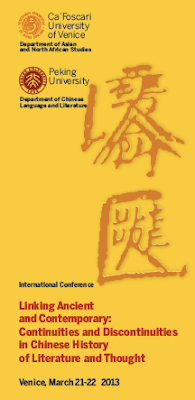.
Abstract
John Mitchel on his way to exile conversed with naval
officers responsible for British conquests in China. In his translation of the 三字經 Sanzijing, Sir Herbert Giles, an English diplomat in China,
glossed 家 jiā as ‘a pig
beneath a roof’, and remarked to his intended British readership that ‘our’
Irish neighbours would certainly understand this. His discourse demonstrates
the effects of attempting to master the colonised ‘abroad’ on his attitudes
toward the colonised ‘at home’. Anonymous Irish soldiers and police helped
colonise the British Empire. Some later turned against colonisation and fought
to liberate Ireland and other colonies. The major source of information about
the Taiping movement in Nanjing in the mid-nineteenth century was an anonymous
Irishman who became a mercenary. Roger Casement went from being an agent of
imperialism to an agent of the Easter Rising; his reports on colonisation in
Africa and in Latin America inspired Joseph Conrad to write Heart of Darkness and Nostromo. W.G. Sebald, starting from the
connection between Casement and Conrad, portrayed in The Rings of Saturn the decadence that British imperialism produced
at home. Postcolonial studies tend to concentrate on the experience of the
colonised, but not on the impact of imperialism on the colonisers themselves,
or on the underclasses created in the metropole by colonialism. Commemoration
of the anonymous agents and victims of British imperialism in Asia and its
backlash among the Irish is a challenge for Asian Studies in Ireland.
Keywords: postcolonialism, discourse analysis, Chinese
Studies, Irish Studies












